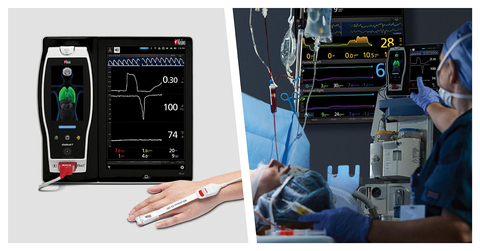New Study Finds Significant Correlation Between Masimo ORi™ and Arterial Partial Pressure of Oxygen During One-Lung Ventilation
- The study findings provide evidence that ORi can offer useful information on arterial oxygenation during one-lung ventilation.
- The study, conducted in South Korea, is the largest to date on ORi, involving 554 patients.
- Masimo ORi™ is a noninvasive, continuous monitoring feature that provides real-time insight into the oxygenation of hemoglobin in the moderate hyperoxic range to be used alongside arterial blood gas analyses.
- The study concluded that ORi values were significantly correlated with PaO2 measured simultaneously, and it can provide useful information for estimating the PaO2 value even during one-lung ventilation.
- None.
Insights
Analyzing...
In the Largest Study of ORi to Date, of 554 Patients, Researchers Conclude: “ORi Can Provide Useful Information on Arterial Oxygenation Even During One-Lung Ventilation”

Masimo Root® with ORi™ (Photo: Business Wire)
Noninvasive, continuous Masimo ORi provides continuous, real-time insight into the oxygenation of hemoglobin in the moderate hyperoxic range (PaO2 > 100 and ≤ 250 mmHg) to be used alongside arterial blood gas analyses, which have the drawbacks of being invasive, intermittent, and delayed. ORi is trended continuously with SpO2 as a unit-less index between 0.00 and 1.00 to extend the visibility of the patient oxygenation beyond SpO2 under supplemental oxygen. By convention, SpO2 is limited to an upper limit of
Noting the importance of striving to prevent hyperoxemia and hypoxemia especially during surgery requiring OLV, because of the risk of pulmonary complications, the researchers sought to evaluate a noninvasive, continuous method of predicting imminent over- or under-oxygenation to overcome the drawbacks of invasive blood gas analysis alone, using Masimo ORi. To evaluate ORi’s performance, they analyzed data collected from 554 patients who underwent non-cardiac elective thoracic surgery requiring OLV between January 1 and December 31, 2022 at a tertiary hospital in
The researchers found a linear correlation between ORi and PaO2 measured simultaneously. Using linear regression analysis, they found there was a statistically significant positive relationship between ORi and PaO2 measured 15 minutes after OLV initiation (r2 = 0.5752, p < 0.001). Using receiver-operated curve (ROC) analysis, they identified an optimal cut-off ORi value of 0.27 to detect PaO2 ≥ 150 mmHg during OLV (area under the ROC curve of 0.96,
The researchers concluded, “ORi values during one-lung ventilation were significantly correlated with PaO2 measured simultaneously. Therefore, the ORi monitor can provide useful information for estimating the PaO2 value even during one-lung ventilation.”
In the
@Masimo | #Masimo
About Masimo
Masimo (NASDAQ: MASI) is a global medical technology company that develops and produces a wide array of industry-leading monitoring technologies, including innovative measurements, sensors, patient monitors, and automation and connectivity solutions. In addition, Masimo Consumer Audio is home to eight legendary audio brands, including Bowers & Wilkins, Denon, Marantz, and Polk Audio. Our mission is to improve life, improve patient outcomes, and reduce the cost of care. Masimo SET® Measure-through Motion and Low Perfusion™ pulse oximetry, introduced in 1995, has been shown in over 100 independent and objective studies to outperform other pulse oximetry technologies.2 Masimo SET® has also been shown to help clinicians reduce severe retinopathy of prematurity in neonates,3 improve CCHD screening in newborns4 and, when used for continuous monitoring with Masimo Patient SafetyNet™ in post-surgical wards, reduce rapid response team activations, ICU transfers, and costs.5-8 Masimo SET® is estimated to be used on more than 200 million patients in leading hospitals and other healthcare settings around the world,9 and is the primary pulse oximetry at 9 of the top 10 hospitals as ranked in the 2022-23
RPVi has not received FDA 510(k) clearance and is not available for sale in
References
- Bang Y, Seong Y, Jeong H. Association between Oxygen Reserve index nd arterial partial pressure of oxygen during one-lung ventilation: a retrospective cohort study. J Anesth. 7 Sept 2023. DOI: 10.1007/s00540-023-03259-4
- Published clinical studies on pulse oximetry and the benefits of Masimo SET® can be found on our website at http://www.masimo.com. Comparative studies include independent and objective studies which are comprised of abstracts presented at scientific meetings and peer-reviewed journal articles.
- Castillo A et al. Prevention of Retinopathy of Prematurity in Preterm Infants through Changes in Clinical Practice and SpO2 Technology. Acta Paediatr. 2011 Feb;100(2):188-92.
- de-Wahl Granelli A et al. Impact of pulse oximetry screening on the detection of duct dependent congenital heart disease: a Swedish prospective screening study in 39,821 newborns. BMJ. 2009;Jan 8;338.
- Taenzer A et al. Impact of pulse oximetry surveillance on rescue events and intensive care unit transfers: a before-and-after concurrence study. Anesthesiology. 2010:112(2):282-287.
- Taenzer A et al. Postoperative Monitoring – The Dartmouth Experience. Anesthesia Patient Safety Foundation Newsletter. Spring-Summer 2012.
- McGrath S et al. Surveillance Monitoring Management for General Care Units: Strategy, Design, and Implementation. The Joint Commission Journal on Quality and Patient Safety. 2016 Jul;42(7):293-302.
- McGrath S et al. Inpatient Respiratory Arrest Associated With Sedative and Analgesic Medications: Impact of Continuous Monitoring on Patient Mortality and Severe Morbidity. J Patient Saf. 2020 14 Mar. DOI: 10.1097/PTS.0000000000000696.
- Estimate: Masimo data on file.
- http://health.usnews.com/health-care/best-hospitals/articles/best-hospitals-honor-roll-and-overview.
Forward-Looking Statements
This press release includes forward-looking statements as defined in Section 27A of the Securities Act of 1933 and Section 21E of the Securities Exchange Act of 1934, in connection with the Private Securities Litigation Reform Act of 1995. These forward-looking statements include, among others, statements regarding the potential effectiveness of Masimo ORi™. These forward-looking statements are based on current expectations about future events affecting us and are subject to risks and uncertainties, all of which are difficult to predict and many of which are beyond our control and could cause our actual results to differ materially and adversely from those expressed in our forward-looking statements as a result of various risk factors, including, but not limited to: risks related to our assumptions regarding the repeatability of clinical results; risks related to our belief that Masimo's unique noninvasive measurement technologies, including Masimo ORi, contribute to positive clinical outcomes and patient safety; risks that the researchers’ conclusions and findings may be inaccurate; risks related to our belief that Masimo noninvasive medical breakthroughs provide cost-effective solutions and unique advantages; risks related to COVID-19; as well as other factors discussed in the "Risk Factors" section of our most recent reports filed with the Securities and Exchange Commission ("SEC"), which may be obtained for free at the SEC's website at www.sec.gov. Although we believe that the expectations reflected in our forward-looking statements are reasonable, we do not know whether our expectations will prove correct. All forward-looking statements included in this press release are expressly qualified in their entirety by the foregoing cautionary statements. You are cautioned not to place undue reliance on these forward-looking statements, which speak only as of today's date. We do not undertake any obligation to update, amend or clarify these statements or the "Risk Factors" contained in our most recent reports filed with the SEC, whether as a result of new information, future events or otherwise, except as may be required under the applicable securities laws.
View source version on businesswire.com: https://www.businesswire.com/news/home/20231210873994/en/
Masimo
Evan Lamb
949-396-3376
elamb@masimo.com
Source: Masimo







